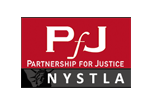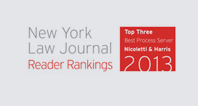Federal Laws Prohibiting Interference with Service of Process
The Federal Law on this subject is covered in Title 18 U.S.C. 1501, which provides in relevant part:
Assault on Process Server
Whoever knowingly and willingly obstructs, resists or opposes any officer of the United States, or other person duly authorized, in serving, or attempting to serve or execute, any legal or judicial writ or process of any court of the United States…shall, except as otherwise provided by law, be fined not more than $300 or imprisoned not more than one year, or both.
Federal Rules of Civil Procedure
The Federal Law on this subject is covered in Federal Rules of Civil Procedure, published by Legal Information Institute, which provides in relevant part:
Rule 4.1. Serving Other Process
(a) In General. Process—other than a summons under Rule 4 or a subpoena under Rule 45—must be served by a United States marshal or deputy marshal or by a person specially appointed for that purpose. It may be served anywhere within the territorial limits of the state where the district court is located and, if authorized by a federal statute, beyond those limits. Proof of service must be made under Rule 4(l).
(b) Enforcing Orders: Committing for Civil Contempt. An order committing a person for civil contempt of a decree or injunction issued to enforce federal law may be served and enforced in any district. Any other order in a civil-contempt proceeding may be served only in the state where the issuing court is located or elsewhere in the United States within 100 miles from where the order was issued.
(As added Apr. 22, 1993, eff. Dec. 1, 1993; amended Apr. 30, 2007, eff. Dec. 1, 2007.)
Notes of Advisory Committee on Rules – 1993
This is a new rule. Its purpose is to separate those few provisions of the former Rule 4 bearing on matters other than service of a summons to allow greater textual clarity in Rule 4. Subdivision (a) contains no new language.
Subdivision (b) replaces the final clause of the penultimate sentence of the former subdivision 4(f), a clause added to the rule in 1963. The new rule provides for nationwide service of orders of civil commitment enforcing decrees of injunctions issued to compel compliance with federal law. The rule makes no change in the practice with respect to the enforcement of injunctions or decrees not involving the enforcement of federally-created rights.
Service of process is not required to notify a party of a decree or injunction, or of an order that the party show cause why that party should not be held in contempt of such an order. With respect to a party who has once been served with a summons, the service of the decree or injunction itself or of an order to show cause can be made pursuant to Rule 5. Thus, for example, an injunction may be served on a party through that person’s attorney. Chagas v. United States, 369 F.2d 643 (5th Cir. 1966). The same is true for service of an order to show cause. Waffenschmidt v. Mackay, 763 F.2d 711 (5th Cir. 1985).
The new rule does not affect the reach of the court to impose criminal contempt sanctions. Nationwide enforcement of federal decrees and injunctions is already available with respect to criminal contempt: a federal court may effect the arrest of a criminal contemnor anywhere in the United States, 28 U.S.C. §3041, and a contemnor when arrested may be subject to removal to the district in which punishment may be imposed. Fed. R. Crim. P. 40. Thus, the present law permits criminal contempt enforcement against a contemnor wherever that person may be found.
The effect of the revision is to provide a choice of civil or criminal contempt sanctions in those situations to which it applies. Contempt proceedings, whether civil or criminal, must be brought in the court that was allegedly defied by a contumacious act. Ex parte Bradley, 74 U.S. 366 (1869). This is so even if the offensive conduct or inaction occurred outside the district of the court in which the enforcement proceeding must be conducted. E.g., McCourtney v. United States, 291 Fed. 497 (8th Cir.), cert. denied, 263 U.S. 714 (1923). For this purpose, the rule as before does not distinguish between parties and other persons subject to contempt sanctions by reason of their relation or connection to parties.
Committee Notes on Rules – 2007 Amendment
The language of Rule 4.1 has been amended as part of the general restyling of the Civil Rules to make them more easily understood and to make style and terminology consistent throughout the rules. These changes are intended to be stylistic only.
*This page is designed for general information only. The information presented on this page is subject to change.












